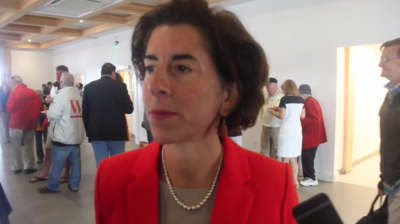I Will Vote Against Current PawSox Deal: Guest MINDSETTER™ Sheehan
Monday, November 06, 2017
The Pawtucket Red Sox have been a beloved sports tradition for some 47 years, and I hope they will continue for years to come. However, as a state senator who has to vote to build a new, publicly backed stadium, I have a responsibility to protect the public interest. While efforts have been made to improve the proposal, it falls short of being a good deal for the taxpayers.
The cost is estimated at $71 million, which will be raised through the sale of revenue or moral obligation bonds. Three parties would share the expense to be paid off over 30 years. The state would pay $23 million, the city of Pawtucket $15 million and the team owners $33 million, in addition to a one-time equity contribution of $12 million.
In this recent proposal, Rhode Island would shoulder the lion’s share of the risk. While proponents argue that there is no legal requirement to repay moral obligation bonds, we have learned through the painful 38 Studio’s experience that public agencies are essentially too big or important to fail. Therefore, the state would serve as the ultimate backstop should Pawtucket, the team or the league fail to meet their obligations. Given the declining attendance at McCoy Stadium, this could be a realistic prospect over 30 years. Even in the medium term, it is difficult to predict if the team will continue to have sufficient operating income and cash flow capacity to support its portions of the projected debt service.
GET THE LATEST BREAKING NEWS HERE -- SIGN UP FOR GOLOCAL FREE DAILY EBLASTMuch has been said about how Pawtucket stands to gain in economic development. The city predicts that the bulk of this revenue would derive from taxes generated from the stadium and business development. However, the most reliable research on publicly-backed stadiums has concluded that new sports facilities have an extremely small effect on overall economic activity and employment. That is why reputable economists have concluded that the public return on investment in sports facilities is minimal at best.
Should Pawtucket not realize additional tax revenues, the city could be in serious financial trouble. To ensure that it may make its debt payments, Pawtucket has pledged its state-based financial aid (minus money for education). I worry that this is an imprudent gamble which could seriously harm the health and welfare of the residents of Pawtucket. I am also skeptical that this pledge would shield the state from additional financial exposure, since I do not believe the state would sit idly by while the people of Pawtucket suffer. In this instance, the state likely would assume the city’s share of the debt payments.
Another unknown variable is how much it will cost to acquire the old Apex property. As a hedge against a high asking price by the current owner, proponents have proposed a very troubling change to the eminent domain law. Under current law, a property must be deemed “substandard” or “blighted” in order for a redevelopment agency to seize it by eminent domain. However, since the old Apex property is neither blighted nor substandard, the change to the law is designed to permit the Pawtucket Redevelopment Agency to seize the old Apex land to push the PawSox stadium forward should the asking price of the Apex property rise too high. This would open a Pandora’s Box for the unjust taking of people’s homes or businesses around the state.
Lastly, monies raised through bonds and used for the benefit of well-to-do business people translates into money that could be used for a higher purpose, such as for economic incentives that would yield better paying jobs. We hear a lot about the jobs that will be generated by the building of a new baseball stadium. However, many of the better-paying jobs would be in construction and, as such, be short-lived. The jobs generated at the ball park are seasonal and most often low-paying. Even Minor league baseball players are among the worst paid professional athletes in America. The pay is so low that a bill was introduced in Congress in 2016, ostensibly at the behest of wealthy team owners, to say 7,500 minor league players are not entitled to either minimum wage guarantees or overtime pay, even though most are working 60 to 70 hours a week!
Unless substantive changes are made to the current Pawtucket Red Sox stadium legislation, I will be voting against it.
The author, James Sheehan of North Kingstown, is a state senator representing both North Kingstown and Narragansett.
Related Slideshow: 7 Questions the PawSox Need to Answer in Hearings
Related Articles
- GoLocalTV: PawSox Stadium Opponents Rally at RI State House
- PawSox Stadium Opponents to Up Pressure at State House this Week
- A Timeline of the PawSox Stadium Controversy
- PawSox Stadium Opponents Claim Political Intimidation from State
- PawSox Stadium Opponent “Intimidated” by Cranston Police After Calling Fung
- NEW: Bill to Require Voter Approval for PawSox Stadium in House Finance
- Guest MINDSETTER™ Dr. Mazze - New PawSox Stadium v. 38 Studios Lessons Unlearned
- New Owners Don’t Rule Out Public Funding For New Providence PawSox Stadium
- Jencunas: Providence PawSox Stadium - Boon or Bust?
- NEW: Bill Introduced to Require Voter Approval for PawSox Stadium Deal
- EXCLUSIVE: New PawSox Stadium Location Emerges in Providence
- Providence Residents Increasing Opposition to PawSox Stadium
- PawSox Stadium Winners and Losers: The 2nd Bloodless Revolution
- Dates Announced for PawSox Stadium Legislation Hearings
- RI Voters Should Decide Fate of Proposed PawSox Stadium, Says Taxpayer Group
- Frias Goes Door-to-Door in Mattiello’s District Voicing Opposition to PawSox Stadium Funding
- Libertarian Party Candidate Hunt Jr. Slams PawSox Stadium Proposal
- RI Hispanic Chamber of Commerce Endorses New PawSox Stadium at Slater Mill
- PawSox Stadium Watchdogs Keep Pressure on General Assembly Following Abrupt Halt
- Mattiello: House Finance Committee to Review New PawSox Stadium Proposal in Fall
- NEW: PawSox Stadium Opponents Declare Success, Rally Planned for Thursday
- VIDEO - What the PawSox Stadium Would Look Like in Worcester
- Another Year, Another PawSox Stadium Controversy
- EDITORIAL: The PawSox Stadium Solution
- GoLocal Benchmark Poll: RIers Overwhelmingly Oppose Public Funding for the PawSox Stadium















